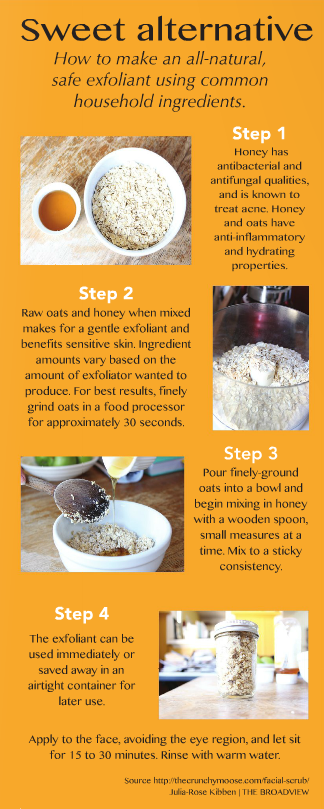Microbeads cause wave of macro effects
Polyethylene beads wash out ocean life.
November 5, 2015
Neon-colored beads have become a part of many daily hygiene routines and may even make face wash bottles more appealing, but the microplastic polyethylene pearl-like beads, used as an exfoliator in many over-the-counter facial cleansers, are killing marine life.
“I’m ashamed to say that I used to use a face wash with microbeads in it,” junior Georgia Ellis, who signed a Change.org petition to ban microbeads from beauty products, said. “I heard about the plastic microbeads going into water supplies, so I transferred over to microbead-free products.”
Microbeads are not biodegradable and exist indefinitely once they arrive in the ocean.
 “The microbeads are not any more attractive than a natural exfoliant like sea salt or charcoal,” Ellis said. “They were just cheap, and in a bottle I could buy at CVS.”
“The microbeads are not any more attractive than a natural exfoliant like sea salt or charcoal,” Ellis said. “They were just cheap, and in a bottle I could buy at CVS.”
Round jojoba beads, a renewable and biodegradable natural resource that is used in some moisturizers and exfoliants, inspired the spherical shape of microbeads, which are gentler than harsher natural exfoliant bases like salts or sugars.
“When I was a teenager, we had exfoliants, but they were natural,” marine biology teacher Marisa Orso said. “They were walnut shells ground up and sugar or salt based, and they had the scrubbing power to exfoliate the dead skin cells.”
Some adolescents often use these products in an attempt to ward off acne and clogged pores, and fall victim to marketing schemes by becoming attracted to colorful face washes, according to junior Charlotte Cobb.
“Girls who are seeking a glow want to appear like models do in ads who have this beautiful skin,” Cobb said. “But, it’s not worth it because the microbeads are causing so much harm to the earth.”
Researchers are not able to accurately determine the extent of microbeads in the ocean as the beads sink to unmeasurable depths and most have been consumed by sea creatures, according to 5 Gyres, an organization committed to marine conservation through research, education and adventure.
“The plastic is getting into the bottom of the food web,” Orso said. “The long-term implications of that are unknown, but they can’t be good.”
Microbeads mimic food, and plankton are roughly about the same size, according to Orso.
“Animals starve to death because their stomachs are full of plastics like these microbeads that they can’t digest,” Orso said.
Skincare companies are largely ignoring the fact that sewage treatments are simply not designed to funnel out such tiny particles, according to Orso.
“Cosmetic companies need to own up to the fact that they are using materials in their products that are harming the environment in a big way,” Ellis said.
Other product formulas could eliminate the microbead problem altogether.
“These companies could easily be using different, more natural materials in their products that would do the same job as plastic microbeads without further polluting our oceans,” Ellis said. “Companies should start making a transition over to products with these biodegradable materials as soon as possible.”
Sewage treatments entail a multi-step screening process, according to Orso.
“The problem is that by the time you get to the smallest screen in the screening process, the microbeads are going to slip right through it,” Orso said. “Most people don’t realize that their waste-water gets screened, but that the reality is that these things are so small, they just pass right through, every one of them going straight into the body of water where your waste goes.”
Illinois, Maine, New York, New Jersey, Colorado, Indiana and Maryland have already passed bans on the use of microbeads in beauty and skincare products. The bill focuses on waste management and safety for marine life. California’s bill to do the same has been sent to Governor Jerry Brown to be signed, which if passed will go into effect in 2020.
In the meantime, Ellis encourages her peers to use safer alternatives including sea salt and charcoal products.
“I care about what goes into the ocean because I’m very aware of the damage that plastic does,” Ellis said. “It never disintegrates and never goes away.”
When particles of sea salt get washed down the drain, they are only returning to where they came from, harming nothing in the process.
“Your skin is a natural organ and therefore deserves to be treated with natural products,” Cobb said.









